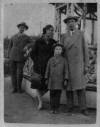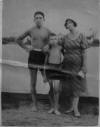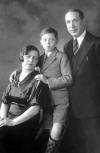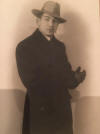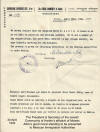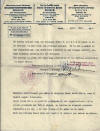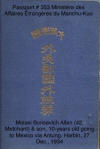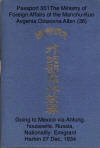 |
Harbin, Heilongjiang PROVINCE, China |
Harbin Photos and Documents
From the Albin-Bialik-Krajmalnik Family
Courtesy of the Albin Family
Moisiei Borisevich Albin (Yaacov Moshe ben Avrom Dov, later known as
Moisés)
was born in Zhytomyr, Ukraine, in 1895
and given the name of his maternal great-grandfather, Yaakov Moshe (Yankel
Moshe) Bialik.
Yaakov Moshe, who died two years before Moisés was born, was the man who
raised the orphaned Chaim Nachman Bialik, the National Poet of Israel. The
poet reportedly signed the ketubah for Moisés and his wife, Evgenia (Xenia)
Subkis (b. 1899 in Odessa), the daughter of Osip Shmuel Zubkis, a jeweler,
and his wife, Fanny Goldenthal.
Moisés
and Xenia owned a prosperous shoe business in Odessa and lived with their
son, Boris, in an upscale apartment on Deribasovskaya Street. Because of the
upheavals and persecutions in Soviet Russia, their business partner, Ivan
Ivanov, fled to the West through Bulgaria around 1927. The Ivanov family was
never heard from again, so Moisés together with his older sister, Sonia, and
Sonia´s
husband, Isaac Krajmalnik --
some 20 years Moisés’
senior --
deemed the eastern escape route the less perilous one.
Isaac Krajmalnik’s
second son, Mordko (Mitya), was the first one sent to cross the dangerous
Sino-Russian border to Harbin in 1927 or 1928 while still a teenager to set
a foothold for the family in Manchuria. His older brother Pesaj (Pedro)
Krajmalnik was sent around the same time to Mexico to see if there were
possibilities for resettlement there as well. Isaac and Sonia’s youngest
son, Lejb (León) remained with his parents. The older Krajmalnik boys, in
their late teens and early twenties, were the pioneers who were sent from
Odessa to far distant corners of the world, China and Mexico, in the hopes
of finding safe haven for the family.
In 1928, having been arrested once in Odessa and with Mitya already in
Harbin,
Moisés
had valuables placed inside the soles of shoes made at his factory and
traveled to Vladivostok with forged papers. It’s believed that he (and Mitya
before him) received help from the Far Eastern Jewish Central Information
Bureau, which had offices in Harbin and Yokohama, and ran a Jewish
underground railroad to help victims of pogroms and other calamities. From
Vladivostok,
Moisés
was smuggled across the border to Harbin. His wife Xenia and young son
Boris
followed later that year, crossing illegally into Manchuria with the help of
the same Chinese guides who had helped Mitya a few months earlier. They
traveled at night to reduce the chances of being apprehended.
By 1932, Isaac and Sonia Krajmalnik, with young León, had already deemed
Mexico to be a safer place for the family to settle and passed through
Harbin en route to Yokohama where they boarded the ship to Mexico. In
Harbin, soon after his arrival in 1928, Moisés partnered with Fyodor (Fedya,
Theodor) Volkov (Volkoff) in a wholesale dairy business. But by 1933,
prosperous Jews like the Albins were being kidnapped and murdered in
increasing numbers in Harbin, so the family procured papers from the
Manchukuo authorities to allow them to leave, once again with the help of
the Far Eastern Jewish Central Information Bureau. Together with Mitya, they
departed for Yokohama, Japan, in 1934 and from there sailed to Manzanillo,
Mexico, arriving in 1935. Isaac Krajmalnik’s enormous sacrifice of sending
his two young sons to find safety paid off. Mexico was to become the country
that welcomed them, first Pedro Krajmalnik around 1928; then Isaac, Sonia
and León
in 1932;
and finally Mitya, Moisés, Xenia, and Boris in 1935.
Fyodor Volkoff, his wife Mina and their son David went to Australia and then
to San Francisco. He and Moisés remained in touch all their lives. Upon
arriving in Mexico, all members of the Albin-Bialik-Krajmalnik families used
their official Mexican names, formed by the given name followed by the
paternal last name and then the maternal one.
Thus, Moisiei Borisevich Albin became Moisés Albin Bialik, Xenia
became Eugenia Subkis Goldenthal, and Mordko (Mitya to the family) became
Marcos Krajmalnik Albin.
In Mexico City, Pedro Krajmalnik married
Serafina (Cima) Joffé Dronzik and died in 1974. Mitya married Susana Fortes
Rudoy and died in 1969. Isaac died in 1957 a day after his wife, Sonia,
passed away. Their youngest son, León, married
María Yanovsky and died in
2011. Moisés died while visiting
Kharkhov, Ukraine, in 1967. Xenia died in 1971. All rest at the Panteón
Israelita in Mexico City. Moisés
and Xenia´s son, Boris, married Graciela (Chela) Zychlinsky Lewental in
Mexico City and died in Houston, Texas, in 2017. He and Chela, who died in
2010, rest at the Beth Israel Cemetery in Houston.
Click on any image below to see a larger version.
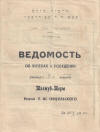 |
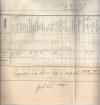 |
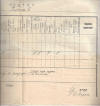 |
|
Boris Albin’s Talmud Torah (Jewish day school) report card from
1934-35 shows his high grades. |
||
Permission to print these images was granted by Veronica Albin in July 2019.
Web Page: Copyright © 2019 Irene Clurman
